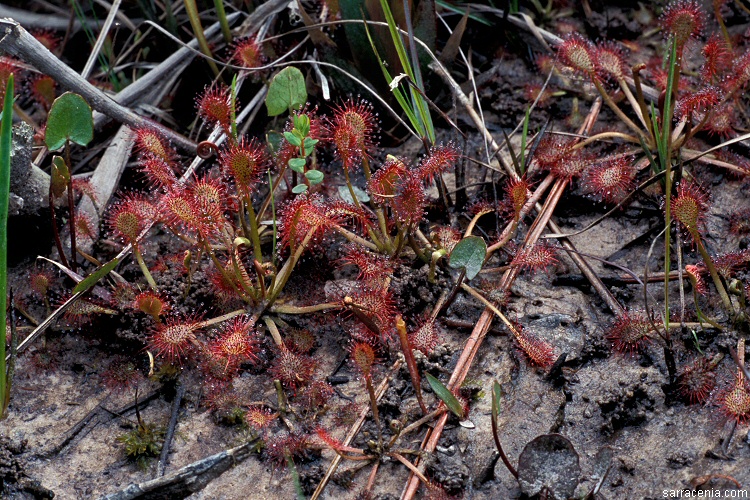
Evil arrives:
Here is another photograph of the weird, long-leafed "Drosera capillaris."
(And here is yet another!)
The plants were about 5-6 cm across. If you want to e-mail me to tell me that I don't know what I'm talking about,
and that these plants are clearly Drosera intermedia, please also include your explanation of what's going
on with the stipules of this plant--a feature that up until now has seemed to be more reliable than leaf shape
at identifying the species.
It was while I was composing this photograph that Satan arrived. The cloven-hooved Beast does not
always appear as the stereotypical red-pigmented, horned, and barb-tailed icon of old illustrations.
Oh no! Evil is more subtle than that! This time, Old Scratch manifested
himself as a pleasant-looking middle-aged plump woman in a blue blouse and heavy makeup, calling to me with concern
from her Lexus sedan
that had materialized miraculously on the side of the road.
In my naiveté, I approached her with a smile on my face. I was composing an
explanation of what Beth and I were doing; I reckoned
she was concerned that we had suffered an automotive breakdown, or were perhaps looking for a lost pet, or were
suffering some other
little drama that she could help us with.
Instead, the parting of the veils revealed that she was the realtor for the property and wanted to know the reason
for our interest
in the land. As Beth and I had only been poking around the highway shoulder, we were not trespassing, but that doesn't
stop people from trying to order you away, so I navigated my conversation with her carefully. I told her that we were
naturalists, and were only looking at the interesting and lovely plants. (A surprising number of landowners take pride in
the natural values of their land, and complements are usually received well.)
She looked at the overgrown lot and crinkled her eyes in disbelief--I did not yet have her eating out of my
hand. I tried the ecotourism angle (figuring that, as a realtor, she would appreciate anything that would bring tourism
and out-of-town dollars to her back yard), and told her that we had flown from California to vacation here, primarily to enjoy the natural
features of coastal Mississippi. Again the eyes crinkled, and this time she pursed her mouth. She explained that from
her perspective, the
"swampy plants" were just an annoyance, and that she was hoping to drain the site soon so it would sell
better.
I smilingly suggested that if the wetlands were drained, this part of Mississippi would get more flooding.
"Not if we put in big enough drains," she replied.
She wasn't budging. I looked at the Sarracenia alata flowers fluttering in the wind kicked up by passing traffic.
Was I their only hope? What could I say that might save these little things? They were like little lost kittens.
I tried another tactic.
I brought her a few sundews, hoping to reunite her with the spark of childlike wonder that she apparently abandoned in a
schoolyard. She was unimpressed. I encouraged her to follow me to see some pitcher plants
close up, so she could marvel at the wonder of nature. She wouldn't venture off the road and onto the muddy
shoulder in her spotless pumps. And when
she looked at Beth in the distance, painted with muddy streaks, I could sense her pity and disdain.
I was running out of arguments. Finally, with a bit of
inaccuracy, I tried the biggest guns I could come up with: "Well, if these wetlands get drained, the birds and
flytraps1 will all go away. And with nothing to eat them, the mosquitos--the kind that carry West Nile
disease or Dengue fever--will
be all over."
It meant nothing to her. In her eyes, the land was nothing but a potential sale, the carnivorous plants were at
most an indication of where drainage pipes should be installed, the creamy yellow Sarracenia alata
flowers were nothing but construction flags.
In the end, she gave us verbal permission to collect anything we wanted: "Take it all, whatever, take
it if you want it."
And then she drove off, her perfume hanging in the air for a few moments until the traffic-wind
carried it off. ("As a foulness shall ye know them")
I had failed. Sadly, I looked upon the doomed plants in front of me
and reflected upon the attitude of greed, perfectly summed up by Old Scratch:
Take it all, whatever, take it if you want it.
1I know, these aren't Venus flytraps, but it is a common-enough name for any carnivorous plant.